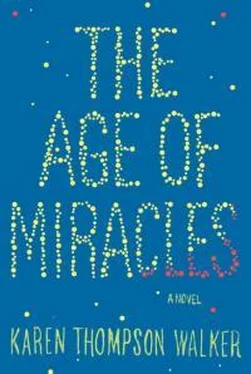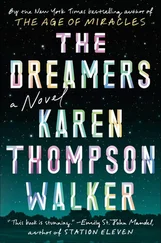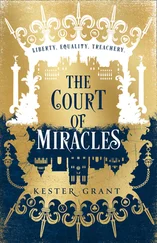“There’s Mars,” said my father, squinting one eye while he aimed the other through the telescope. He motioned for me to look. “You’ll be able to see it even better when it gets dark.”
Mars had shown up in the news lately, after draft plans for something called the Pioneer Project had surfaced on the Internet. Privately funded by a group of secretive billionaires, it was a plan for a human settlement on Mars, complete with temperature-controlled biospheres and a self-cleaning water supply. The Pioneer Project was an evacuation plan from Earth. If necessary, a cluster of humans could supposedly survive up there on Mars, the whole settlement like a time capsule, like a living, breathing souvenir of life as we once knew it on Earth.
Through the telescope, Mars didn’t look like much to me, a fat red dot, hazy at the edges.
“Some of the stars you’ll see out there don’t exist anymore,” said my father, gently turning the knobs of the telescope with his thumb. The gears squeaked softly. “Some of the stars you’ll see have been dead for thousands of years already.”
“Are you two going to be up here all night?” asked my mother.
My father wiped the lens with a black strip of felt that had come in the box.
“What you’ll see with this telescope are not the stars as they are today but how they were thousands of years ago,” he went on. “That’s how far away they are; even the light takes centuries to reach us.”
“If we’re ever going to have dinner,” said my mother from behind us, “we should eat.”
My father didn’t answer, but I was eager to calm her. “We’ll be ready soon,” I said.
I liked the idea, how the past could be preserved, fossilized, in the stars. I wanted to think that somewhere on the other end of time, a hundred light-years from then, someone else, some distant future creature, might be looking back at a preserved image of me and my father at that very moment in my bedroom.
“Couldn’t that be true?” I said to my father. “Like a hundred light-years from now?”
“Could be,” he said.
But I wasn’t sure he was listening.
I would spend a lot of hours watching the stars that year, but I used my telescope to spy on nearer bodies, too. I soon realized I could see into the other houses on the street. I could watch the Kaplans, all seven of them, sitting down to dinner. I could see Carlotta at the end of our cul-de-sac, drinking tea on her porch, her long braid dangling like macramé, its every strand apparent through my lens; and there was Tom behind her, dumping a bucket of slop onto their compost pile.
But my clearest view was of Sylvia’s house. Hers faced ours like a mirror image, and I could see right into her living room—to the keys of her piano, to the wood boards of her floor, right to the pages of the newspaper that lined the birdcage, now empty.
That night we slept in sunlight, or we didn’t sleep at all. For weeks, I’d been climbing into bed before dark—those early days were endless, those first evenings everlasting; I fell asleep most nights before the stars came out. But this night was different, the gap wider than ever. This was the first of the white nights. We would later learn to shield ourselves, to carve out small patches of darkness amid the light, but that first clock night was radiant, as if the sun had never shone so brilliantly or bright.
On my bedroom ceiling was a scattering of glow-in-the-dark star stickers that I had recently tried to remove. My mother had stopped me—“There’s asbestos in that ceiling, leave it alone.” But my ceiling stars were invisible on this night anyway, just like the real ones were, every one of them washed out by our nearest, dearest star.
“Try to sleep,” said my father. “It’s going to be hard to wake up for school in the dark.” He sat at the foot of my bed, staring at the window, at the blazing blue sky before pulling the blinds shut. “These are amazing times,” he said. “We’re living in some amazing times.”
The sun finally set sometime after two.
The next day our school returned to its clock time start of nine o’clock. That meant we stood in darkness at the bus stop, our faces lit yellow by a distant streetlight, which, like all the streetlights in our region, had been specially designed for dimness—bright lights spoiled the view for the enormous thirty-year-old university telescope that sat on a hill out east. Light pollution , they called it. But what were those astronomers staring at anymore, now that the real action was happening down here?
My mother waited in the car at the curb until the bus arrived, convinced that danger, like potatoes, breeds in the dark. To me, the bus stop seemed just as hazardous as in daylight, and no more so in the dark.
I’d been staying away from Daryl, but he ignored me and acted as if he hadn’t done anything wrong. Somewhere in that dark dirt, I thought, my gold-nugget necklace probably still lay. Seth continued to keep to himself, like a lonesome survivor, blowing on his hands in an attractive, self-sufficient way, one foot on his skateboard, the other on the curb.
All around us that morning, the noise of the crickets was astounding, the squeak and whine of so many new bodies in the dark—they’d been multiplying since the slowing. All the bugs had. More and more birds were dying, and with so few of them left, everything smaller was thriving. More and more spiders were crawling on our ceilings too. Beetles emerged from bathroom drains. Worms slithered over the cement of our patios. One soccer practice was canceled when a million ladybugs descended on the field at once. Even beauty, in abundance, turns creepy.
Hanna’s house was just visible in the distance down the street, and I thought I saw a small light glowing near the front door that morning. I felt a flash of hope that she’d come home. But it was only the porch light, probably left on by accident when they fled, the light unnoticed in the daylight.
We were all quieter than usual on that dark morning. We were sleepy and slouchy and dazed. Even Michaela seemed subdued, having slept too late to wash her hair or do her eyes. No one teased or talked. No one said anything. We stood together in the dark, the hoods of our sweatshirts high on our heads, our fingers curled inside our sleeves.
It was cold, maybe the coldest part of the night, but my watch read 8:40 A.M. The moon was a sliver, glowing low on the horizon. The stars were sparklingly clear.
It’s hard to believe that there was a time in this country—not so long ago—when thick almanacs were printed every year and listed, among other facts, the precise clock time of every single sunrise and every single sunset a year in advance. I think we lost something else when we lost that crisp rhythm, some general shared belief that we could count on certain things.
* * *
When the bus pulled up at school, we discovered that workmen were installing stadium lights all over campus. Under the floodlights, the faded green walls—painted, rumor had it, with surplus paint from the marine base up the coast—looked like those of a prison. That’s one lesson I learned from clock time: So much that seems harmless in daylight turns imposing in the dark. What else, you had to wonder, was only a trick of light?
It was lunchtime when the sun finally appeared, the darkness lifting like fog. Sunrise: 12:34 P.M. We were all outside when it happened. This was California—we ate outside in every season. As the eastern sky turned a pale and promising pink, Michaela went right on teasing the boys around us while I performed the opposite maneuver: keeping quiet and trying not to stand out.
Slowly, the soccer fields began to glitter in the distance. I squinted toward the sunrise. That was when I noticed, on the far edge of the quad, the outline of a girl who looked remarkably like Hanna, except she couldn’t be her, because I would have known if Hanna had come back to town. This girl was sitting alone at a table near the science labs, her head resting on one skinny arm, sulking in the pale light.
Читать дальше












